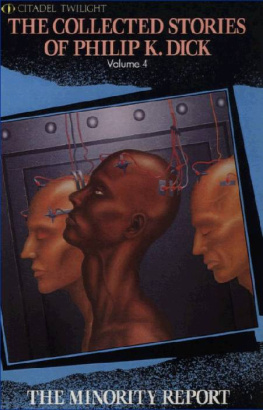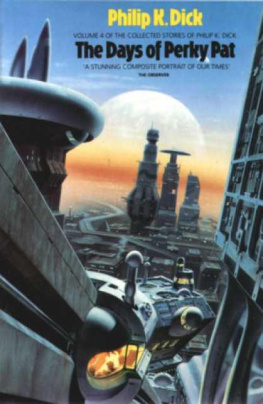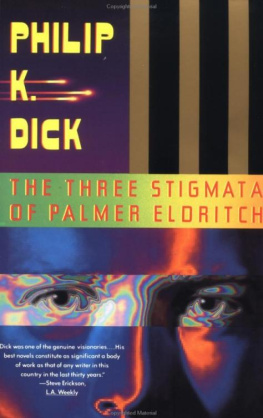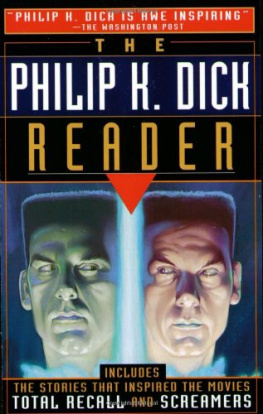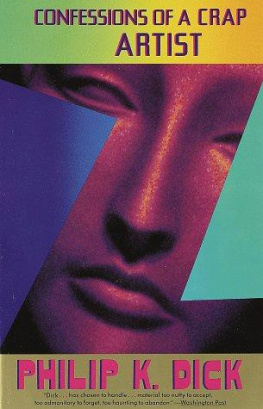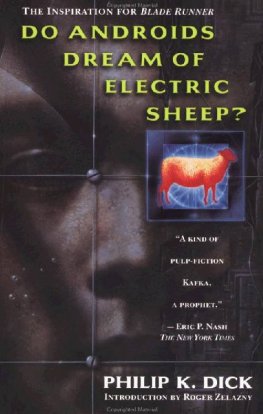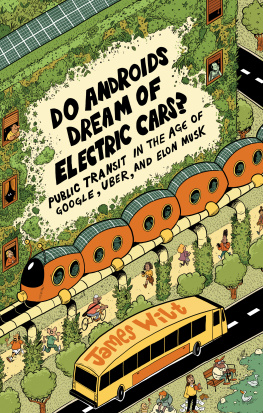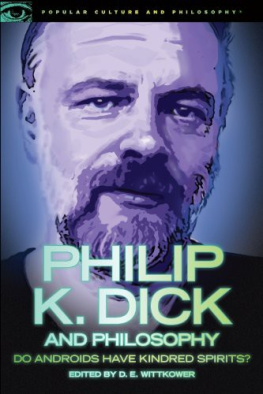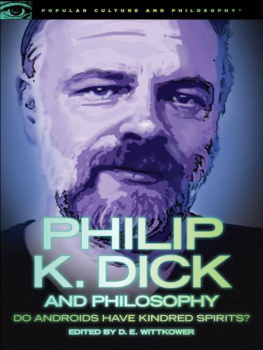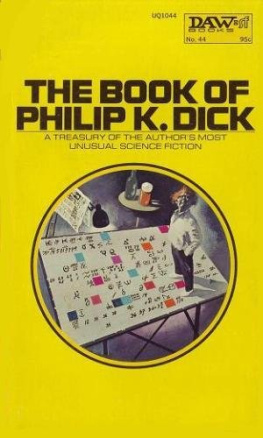Philip K. Dick - Do Androids Dream of Electric Sheep?
Here you can read online Philip K. Dick - Do Androids Dream of Electric Sheep? full text of the book (entire story) in english for free. Download pdf and epub, get meaning, cover and reviews about this ebook. year: 2008, publisher: Ballantine Books, genre: Detective and thriller. Description of the work, (preface) as well as reviews are available. Best literature library LitArk.com created for fans of good reading and offers a wide selection of genres:
Romance novel
Science fiction
Adventure
Detective
Science
History
Home and family
Prose
Art
Politics
Computer
Non-fiction
Religion
Business
Children
Humor
Choose a favorite category and find really read worthwhile books. Enjoy immersion in the world of imagination, feel the emotions of the characters or learn something new for yourself, make an fascinating discovery.

- Book:Do Androids Dream of Electric Sheep?
- Author:
- Publisher:Ballantine Books
- Genre:
- Year:2008
- Rating:5 / 5
- Favourites:Add to favourites
- Your mark:
- 100
- 1
- 2
- 3
- 4
- 5
Do Androids Dream of Electric Sheep?: summary, description and annotation
We offer to read an annotation, description, summary or preface (depends on what the author of the book "Do Androids Dream of Electric Sheep?" wrote himself). If you haven't found the necessary information about the book — write in the comments, we will try to find it.
Do Androids Dream of Electric Sheep? — read online for free the complete book (whole text) full work
Below is the text of the book, divided by pages. System saving the place of the last page read, allows you to conveniently read the book "Do Androids Dream of Electric Sheep?" online for free, without having to search again every time where you left off. Put a bookmark, and you can go to the page where you finished reading at any time.
Font size:
Interval:
Bookmark:
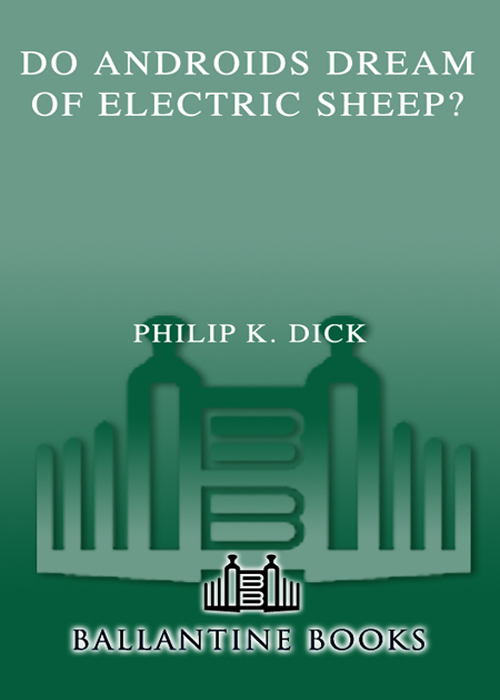
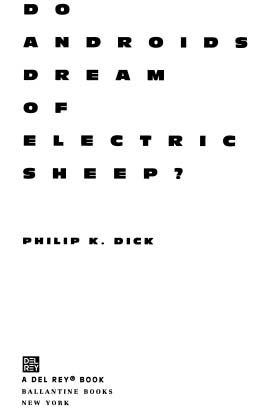
Contents
TO TIM AND SERENA POWERS,
MY DEAREST FRIENDS
PHILIP K. DICK
AN INTRODUCTION BY ROGER ZELAZNY
(1) Once there was a man who repaired trash compactors because that was what he loved doing more than anything else in the world
(2) Once there was a man who repaired trash compactors in a society short on building materials, where properly compacted trash could be used as an architectural base
(3) Once there was a man who hated trash compactors but repaired them for a living and to keep his manic wife in tranquilisers so that he did not have to spend so much time with his mistress, who was less fun now that she had converted to the new religion
(4) Once there was a man who, in purposely misassembling the trash compactors he hated, produced a machine which
It is no good. I cant do it. I can play the Thirteen Ways of Looking at a Trash Compactor Repairman Game, but I cannot turn it into a story at once puzzling, poignant, grotesque, philosophical, satirical, and fun. There is a very special way of doing this and the first step in its mastery involves being Philip K. Dick.
Brian Aldiss has called him one of the masters of present-day discontents, a thing readily apparent in much of his work. But one of the great fascinations his work holds for me is the effects achieved when he dumps these discontents into that special machine in his head and turns on the current. It is not simply that I consider it a form of aesthetic cheating to compare one writer with another, but I cannot think of another writer with whom to compare Philip Dick. Aldiss suggests Pirandello, which is not bad for the one small aspect of reality shuffling. But Pirandellos was basically a destructive machine. It was a triumph of technique over convention, possessed of but one basic message no matter what was fed into the chopper. Philip Dicks is a far more complicated program. His management of a story takes you from here to there in a God-knows-how, seemingly haphazard fashion, which, upon reflection, follows a logical line of developmentbut only on reflection. While you are trapped within the spell of its telling, you are in no better position than one of its invariably overwhelmed characters when it comes to seeing what will happen next.
These characters are often victims, prisoners, manipulated men and women. It is generally doubtful whether they will leave the world with less evil in it than they found there. But you never know. They try. They are usually at bat in the last half of the ninth inning with the tying run on base, two men out, two strikes and three balls riding, with the possibility of the game being called on account of rain at any second. But then, what is rain? Or a ballpark?
The worlds through which Philip Dicks characters move are subject to cancellation or revision without notice. Reality is approximately as dependable as a politicians promise. Whether it is a drug, a time-warp, a machine, or an alien entity responsible for the bewildering shifting of situations about his people, the result is the same: Reality, of the capital R variety, has become as relative a thing as the dryness of our respective Martinis. Yet the struggle goes on, the fight continues. Against what? Ultimately, Powers, Principalities, Thrones, and Dominations, often contained in hosts who are themselves victims, prisoners, manipulated men and women.
All of which sounds like grimly serious fare. Wrong. Strike the grimly, add a comma and the following: but one of the marks of Philip Dicks mastery lies in the tone of his work. He is possessed of a sense of humour for which I am unable to locate an appropriate adjective. Wry, grotesque, slapstick, satirical, ironicNone of them quite fits to the point of generality, though all may be found without looking too far. His characters take pratfalls at the most serious moments; pathetic irony may invade the most comic scene. It is a rare and estimable quality to direct such a show successfully.
Who else in this cockeyed universe could design a society thriving on the bridge-playing abilities of its leaders, with the delightful rule that a husband and wife team may undergo instant divorce at the end of a bad game? Or throw in a car that nags its owner for oil changes, tuneups, and new tires? I see youve already guessed. The book is The Game-Players of Titan.Or a story which opens with a psychoanalyst diagnosing his patient as a typical paranoid for believing he is being followed, has his telephone tapped and that everyone hates himuntil the analyst realises who the man is, understands that he probably is under surveillance and is suddenly overwhelmed with hatred for him. The patient is Doctor Bloodmoney, in the book of the same name, a kaleidoscopically brilliant piece of story-telling.
Three of my other personal favorites are:
Ubikwhich Larry Ashmead at Doubleday thrust into my hands one afternoon with excitement and a smile, telling me I had to read it immediately. I began it on the train back to Baltimore that evening and could have wound up in Cincinnati or Kansas City had it not been for a conductor who might have understudied Jerome Hines. Do Androids Dream of Electric Sheep?, a book I read at a more stationary single sitting, and whose title occasionally runs through my head to the tune of Greensleeves. I am not certain why. The tune, I mean. The single sitting part becomes self-explanatory on opening the book.
Galactic Pot-HealerWhen the encyclopedia defines a particular creature as the dominant life-form on a certain planet and then points out that the species only consists of one memberThis one is almost whimsical. But not quite. A Philip Dick book can never be categorised that neatly. But this one is a bit special in the focussing of its humours (Elizabethan usage) and in the almost pastoral quality of certain sections.
By mentioning these personal favourites, I do not intend to detract from his other works. I have read almost all of Philip Dicks stories and I have never put down a single one with that feeling all readers know at some time or other, that a writer has cheated, has taken an easy way out, rather than addressing himself with his full abilities to the issues he has invoked. Philip Dick is an honest writer in this respector, if I am wrong and he does ever handle something in the other fashion, then it is a tribute to his artistry that he succeeds so well in concealing it.
Inventiveness. Wit. Artistic integrity. Three very good things to have. To say them, however, is perhaps to talk more about the mind behind the words than the ends to which they are addressed. For to say them in all good-intentioned honesty about a story results mainly in a heaping of abstractions.
A story is a series of effects. I owned at the beginning that Philip Dicks effects fascinate me even more than the social discontents pulsing through the neon tube in front of the wrinkled mirror suspended by the piano wire from the windmill of his mind. He is a writers writer, rich enough in fancy that he can afford to throw away in a paragraph ideas another writer might build a book upon. I cannot detail these effects. But then, I could not have written the label for the Ubik can either. It is the variety and near-surreal aptness of his juxtapositions which defend this matter, too, against facile categorisation. The subjective response, however, when a Philip Dick book has been finished and put aside is that, upon reflection, it does not seem so much that one holds the memory of a story; rather, it is the after effects of a poem rich in metaphor that seem to remain.
Next pageFont size:
Interval:
Bookmark:
Similar books «Do Androids Dream of Electric Sheep?»
Look at similar books to Do Androids Dream of Electric Sheep?. We have selected literature similar in name and meaning in the hope of providing readers with more options to find new, interesting, not yet read works.
Discussion, reviews of the book Do Androids Dream of Electric Sheep? and just readers' own opinions. Leave your comments, write what you think about the work, its meaning or the main characters. Specify what exactly you liked and what you didn't like, and why you think so.

